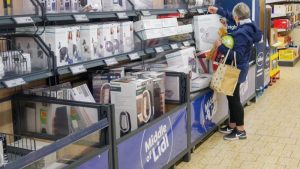Hizbollah’s exploding walkie-talkies likely among many counterfeits, says radio maker
Unlock the Editor’s Digest for free
Roula Khalaf, Editor of the FT, selects her favourite stories in this weekly newsletter.
The Hizbollah walkie-talkies that detonated across Lebanon were likely among tens of thousands of counterfeits, said a director of the Japanese radio equipment maker Icom.
The detonation of walkie-talkies and pagers across Lebanon last week killed at least 35 people and injured hundreds more. Some of the walkie-talkies bore Icom labels.
After the attacks, which came as Israel stepped up its offensive against Hizbollah, Icom launched an investigation into the devices and said its IC-V82 handheld radio “was produced and exported, including to the Middle East, from 2004 to October 2014”.
“We made and shipped 160,000 of those V82 radios in the 10 years before we discontinued them about a decade ago,” Icom executive and board member Yoshiki Enomoto told the Financial Times. “It is possible that the same number of counterfeit models is circulating today.”
Icom said the devices had “not been shipped from our company” since they were discontinued and that those pictured after the attack appeared to be missing a holographic seal used to distinguish counterfeits. The company added that it had also discontinued production of batteries for the devices.
“We are 99.9 per cent sure our products were not involved . . . and we can’t know exactly how many counterfeits are out there,” said Enomoto, underlining risks posed by supply chain security.
Following the attacks, Icom pledged to strengthen its counterfeiting measures, though there are limits to what the company can achieve.
Icom has in the past shut down some counterfeit factories with the help of local authorities. The company also discontinues and upgrades its products every few years, said Enomoto.
The attacks have put the focus on the origins of the exploding devices and how they were weaponised, said Ken Kotani, a professor and defence expert at Nihon University in Japan.
“It is extremely difficult to try to control the supply chains of counterfeit devices, but we have to try to find solutions, probably through technology,” said Kotani.
It is not the first time Icom’s walkie-talkies have been in the spotlight. During the Afghanistan war, reports showed the Taliban using the devices, or copies of them.
Founded and based in a suburb of Osaka, Japan’s third-biggest city, Icom is preparing to celebrate its 60th anniversary this year.
Icom controls about 40 per cent of the amateur radio market, more than 25 per cent of the maritime radio market and 5 per cent of the land mobile market, according to the company. Net sales were $245mn in the fiscal year ending in March 2024, $90mn of which was made in North America.
Icom, which has one Israeli distributor, said the Japanese trade ministry had contacted the company in connection with the attack.
#Hizbollahs #exploding #walkietalkies #among #counterfeits #radio #maker




